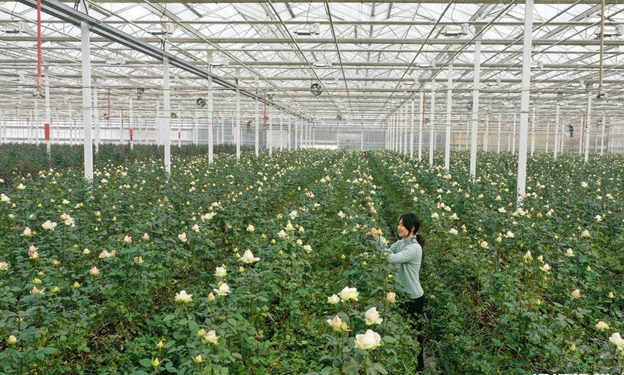Agriculture meets innovation in Shandong Province, where the Dakuishan Smart Greenhouse in Zibo City has set a new standard for sustainable floriculture. Housing 120,000 rose plants, this facility combines geothermal energy and smart technology to produce premium roses year-round while reducing environmental impact.
A Model of Sustainability
The Dakuishan Greenhouse exemplifies resource efficiency by reusing geothermal energy from abandoned mines. This renewable energy source maintains a consistent temperature of 16°C inside the greenhouse, providing ideal conditions for rose cultivation regardless of external weather.
Key benefits of this approach include:
- Reduced Energy Costs: Geothermal systems lower heating expenses by up to 60% compared to conventional methods.
- Minimal Carbon Footprint: By recycling heat, the greenhouse significantly reduces CO2 emissions, contributing to environmental sustainability.
Smart Greenhouse Technology
Automation plays a critical role in the Dakuishan facility. Smart systems monitor and adjust humidity, light, and nutrient delivery to ensure optimal plant health. Such technology increases yield and reduces resource wastage:
- Water Use Efficiency: Advanced irrigation systems cut water consumption by 30-50%.
- Precision Farming: Sensors and AI-driven controls enhance productivity and quality, producing roses that consistently meet market standards.
Economic Impact Through E-commerce
Once harvested, roses are sorted and distributed nationwide via e-commerce platforms. This direct-to-consumer approach eliminates intermediaries, offering competitive pricing and fresh products to buyers. The demand for high-quality roses has surged in China, especially during festive seasons, creating a lucrative market for growers.
In 2023, China’s online flower market was valued at $7 billion, with a projected annual growth rate of 11% through 2030. The Dakuishan Greenhouse taps into this trend, leveraging digital platforms for efficient logistics and broader market access.
Global Trends in Sustainable Floriculture
The innovations in Zibo City reflect a larger global movement toward sustainable floriculture. Countries such as the Netherlands and Kenya are also investing in geothermal greenhouses and smart farming technologies, highlighting the sector’s potential for environmental and economic gains.
The Dakuishan Smart Greenhouse is a testament to how sustainable practices and advanced technology can transform traditional agriculture. By repurposing geothermal energy and integrating smart systems, it not only supports year-round rose cultivation but also enhances economic opportunities for local communities. As consumer demand for sustainably grown flowers continues to rise, the Dakuishan model offers valuable lessons for the global floriculture industry.










